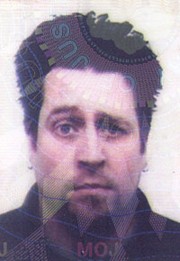| Nagoya Nears Eric Blair |


 |
| Rikishi of Old Joe Kuroda |

 |
| Heya Peek Barbara Ann Klein |


 |
| SFM Interview Mark Buckton |

 |
| Sumo 101 Barbara Ann Klein |
 |
| Photo Bonanza See the Natsu |
 |
| Natsu Basho Summary Lon Howard |

 |
| Lower Division Rikishi Mikko Mattila |

 |
| Nagoya Ones to Watch Mark Buckton |
 |
| Kimarite Focus Mikko Mattila |

 |
| Amateur Angles Howard Gilbert |

 |
| Sumo Game Bruce Rae |
 |
| Sumo in Print Barbara Ann Klein |
 |
| Kokugi Connections Todd Lambert |

 |
| Fan Debate Facilitator – Lon Howard |

 |
| SFM Cartoons Benny Loh & Stephen Thompson |
| Let’s Hear From You What was it that |


 |
| Readers’ Letters |
 |
Sumo Quiz
The Quizmaster
Answer the Qs and win yourself next basho’s banzuke.

James Vath
I came to Japan in January 2001. One Sunday morning, after my usual Saturday night on the town and late-night stumble back to my moldy 3dk apartment, I was sprawled on my floor dozing on and off sloth-like and, it must have been close to 6 p.m. when I turned on the TV to be roused by two sumo giants crashing into each other. It was the final scheduled bout of Natsu Basho 2001, where Musashimaru beat Takanohana to force a playoff
So, I came in at the end of the Takanohana era. After a 7 basho rest he came back and I was able to watch him for only one complete basho. He was never able to come back to full strength, although he did beat Asashoryu in their only match, much to the chagrin of Asashoryu. Musashimaru also started having injury problems. Clearly, I came in at the transition from the
Musashimaru era to the Asashoryu era. Out with the Polynesians, in with the Mongolians.
My interest grew slowly at first as I sought out information on this new thing. There was lots of new terminology to absorb, and the structure of the ranks, etc. to learn. I questioned students, read the newspaper, used the internet occasionally, although I didn't have a computer at the time, which was an impediment. Slowly, slowly I gained an understanding of the sumo world.
I remember first noticing Asashoryu, then at sekiwake. He fought so hard every bout. Such intense fighting spirit really stood out. I would go to the yakitori restaurant at the end of my block and, over yakitori and mugs of beer, gush about how Asashoryu had sent some guy flying into the seats that day. I learned the Japanese for ‘send flying’ specifically to be able to be able to relate this event accurately. I would have to listen to all the complaints about his bad manners and such, learning in the process words like ‘dignity’ in Japanese. Bad manners or not, and
Next
